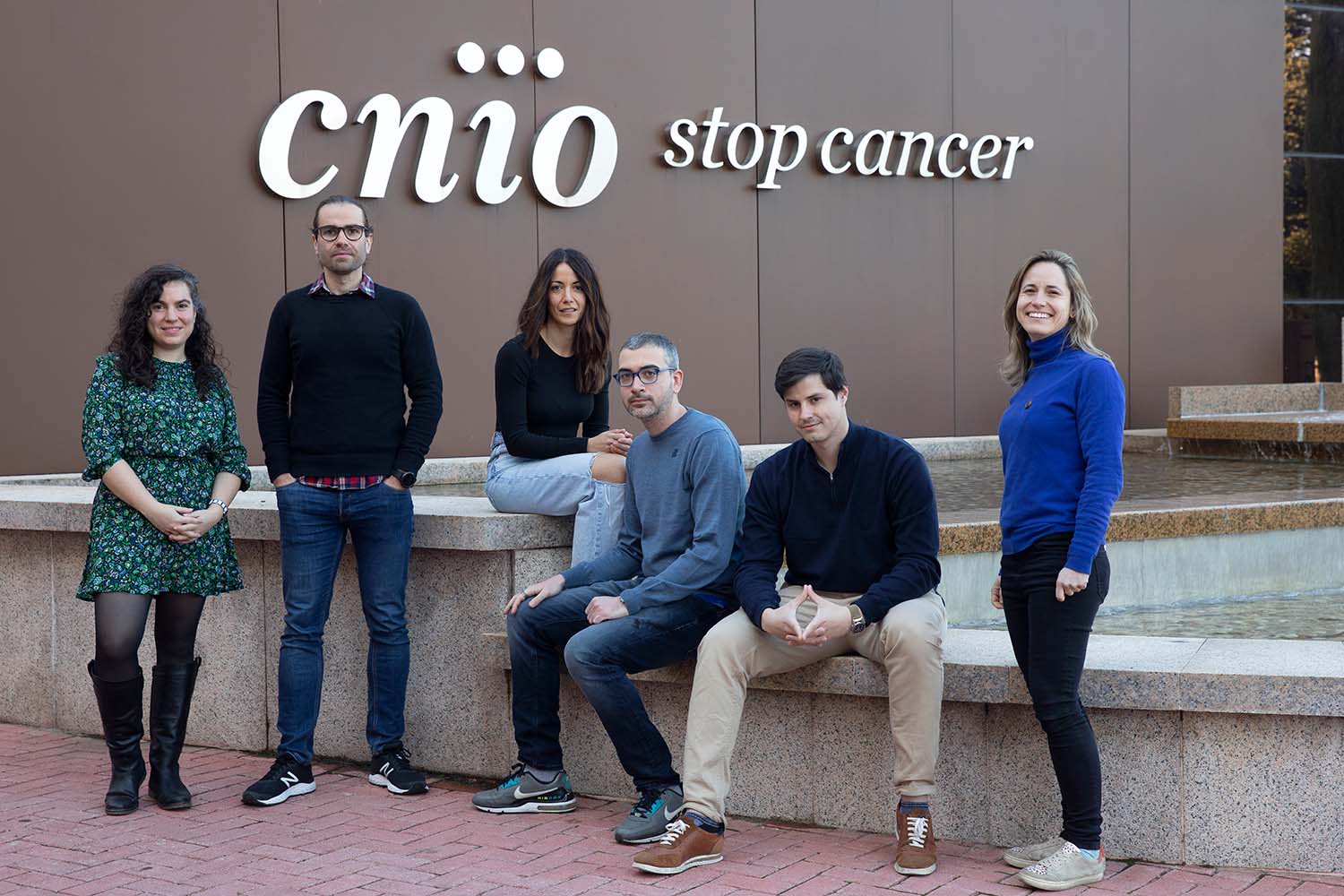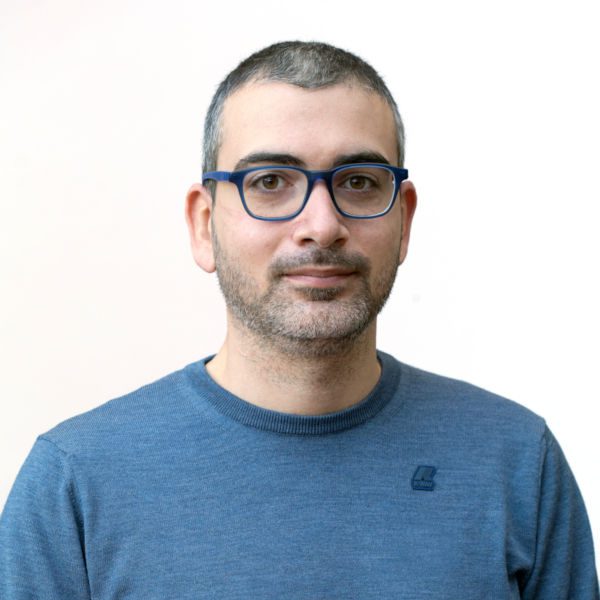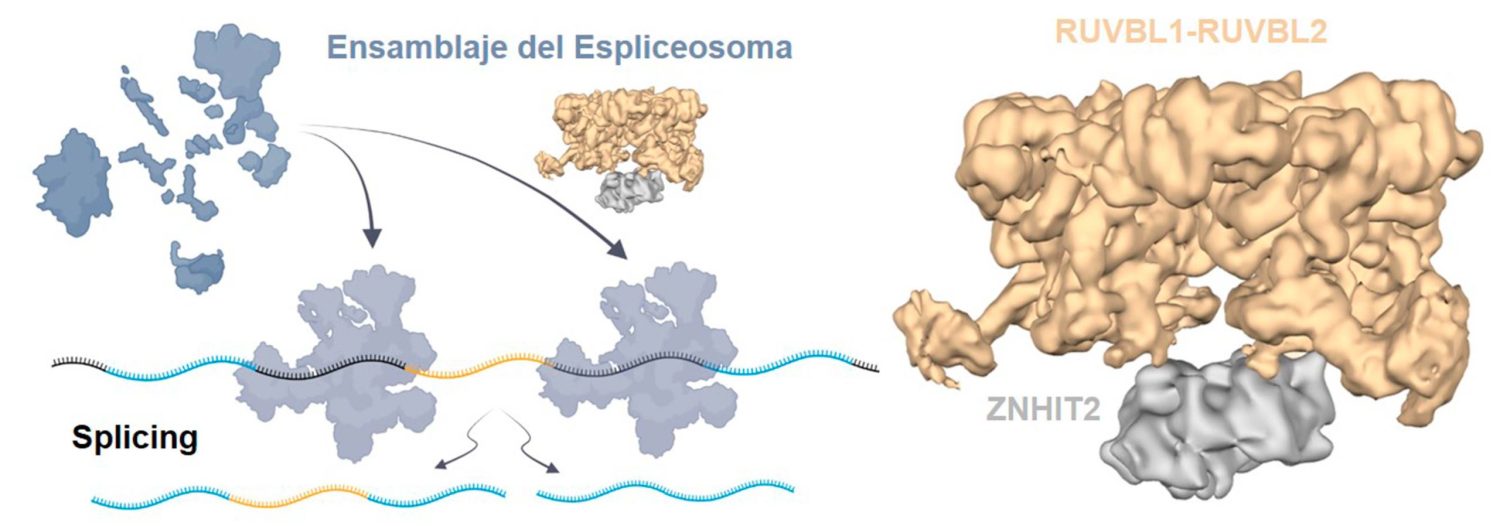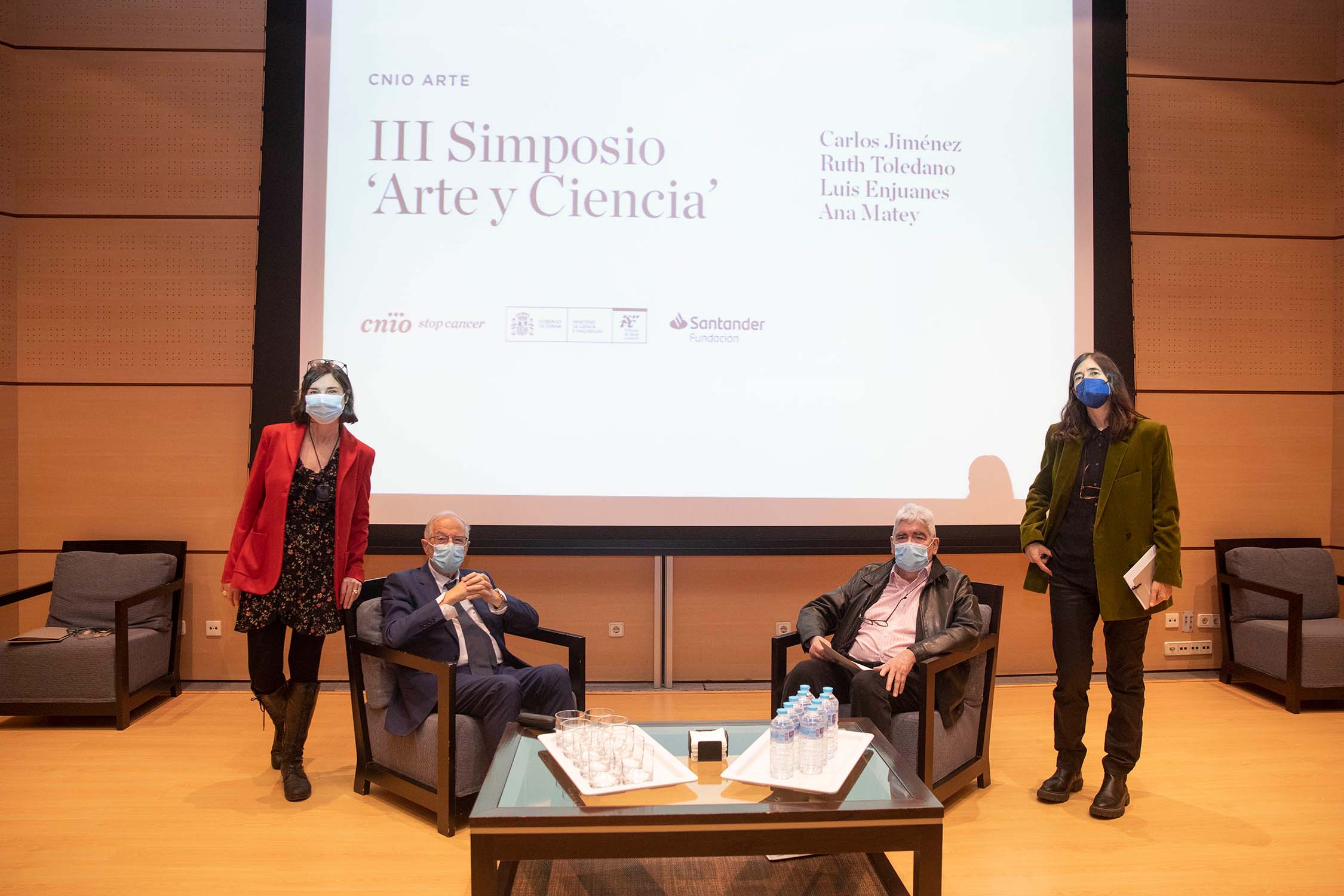This website uses cookies so that we can provide you with the best user experience possible. Cookie information is stored in your browser and performs functions such as recognising you when you return to our website and helping our team to understand which sections of the website you find most interesting and useful.
Columna
 Six of the seven CNIO Friends researches 2023. From left, Ana Maria Roncero, Lluis Cordon, Diana Vara, Federico Virga, Albert Harguindey and Yurena Vivas. /Laura M. Lombardía. CNIO
Six of the seven CNIO Friends researches 2023. From left, Ana Maria Roncero, Lluis Cordon, Diana Vara, Federico Virga, Albert Harguindey and Yurena Vivas. /Laura M. Lombardía. CNIO
Dear Friends,
In the early months of this year, we presented relevant findings that we hope will lead to advances in the diagnosis and treatment of cancer as well as other diseases. You can read about them in the Scientific News section of this newsletter. Additionally, we have launched initiatives that, together with your contributions as CNIO Friends, will strengthen support for our research work by helping us hire new researchers.
This year, on World Cancer Day, observed on the February 4, we launched a “lottery” campaign we are especially proud of, under the title La lotería que más te toca. It had a significant social and media impact, increasing the CNIO’s visibility and support. Also, we continued working to remove the barriers that prevent girls and women from pursuing a career in science. On February 11, the International Day of Women and Girls in Science, we released a video featuring the female researchers at the CNIO talking about the reasons why they became scientists.
Also in February, a month packed with activities, we held the 5th edition of CNIO Arte, an initiative that coincides every year with ARCO, Spain’s international contemporary art fair. As in 2021, ARCO kindly offered us a stand this year. We showed Susana Solano’s sculpture El mundo de las cosas (The World of Things), drawing inspiration from Pedro Alonso’s extensive research on malaria. The sculpture is currently on display at the hall of the CNIO building, whose doors are open to the public, especially to our Friends. You are kindly invited to visit us and take a look at Solano’s work of art.
The most important piece of news of the past few months is the hiring of young researchers through the CNIO Friends International Contract Programme, supported by all of you, who thus contribute to the advancement of cancer research for public benefit.
Thanks to your support last year, as many as six new researchers joined the CNIO this year, and yet another one is expected to join soon. They will face cancer-related challenges in key areas such as metastasis, pancreatic and breast cancer, and metabolic disturbances, among others. Their research is expected to lead to new cancer treatments.
This year, CNIO joined BIZUM Help, a user-friendly platform our donors can use to make their contributions. We appreciate BIZUM’s support and the opportunity they are offering us to be part of this pioneering initiative. We also want to express our deep gratitude to artist Marina Vargas for Intra-Venus, her life-size sculpture representing a breast cancer patient who has undergone a mastectomy, which will be on display at the entrance of the CNIO building this year, and for the Association for the Visibility and Support of Female Artists with Cancer, the organisation she chairs.
Last but not least, I would like to mention British ethologist Jane Goodall, who talked about her career and experience at the event organised by the CNIO to celebrate Women’s Day on March 8, with the support of the Jane Goodall Foundation in Spain and the British Embassy in Madrid. Thank you very much to them all.
To sum up, we feel so proud of having our CNIO Friends by our side, joining forces and resources to wipe out cancer from our world together. I hope you enjoy reading our newsletter. Let me say thank you once again for your generous support.
Maria A. Blasco
Director
MEET THE CNIO FRIENDS RESEARCHERS
Federico Virga
 Federico Virga. / Laura M. Lombardia. CNIO
Federico Virga. / Laura M. Lombardia. CNIO
Federico Virga, from Italy, joined the CNIO this year to undertake an exciting project in the Experimental Oncology Group. His project focuses on how to increase the antitumor response of the immune system in the context of pancreatic and lung cancer induced by KRAS oncogenes. Federico’s research aims to improve the treatment of these tumours, which are among the most aggressive and lethal types of cancer.
Federico became a cancer researcher in particular because he believes it is one of the most deadly diseases with a huge need for more scientific advances, and he personally knows a lot of people who have suffered with it. In addition, Federico has always found cancer to be, from a scientific point of view, a fascinating and complex area of research with a lot of interactions between different cell types. He explained “What you can find in cancer you can apply to other areas. For example, a better knowledge of how the immune response works during cancer progression can provide new insights for the understanding and management of other diseases such as inflammatory or infectious diseases.
Federico was inspired to apply for the CNIO Friends Fellowship because whilst doing his PhD in Belgium, he met a lot of people who had studied in the CNIO and they were all telling him what an incredible, friendly and collaborative centre it was. On top of that, it is known to be on the best centres in Europe and in the world scientifically, so he felt this would be the perfect place to undertake a post-doc.
When asked what he is hoping to achieve with his project, Federico explained “I believe that cancer research is very complex and every scientist can make a small step to an improvement in cancer understanding or management. My project is working toward finding how we can improve the response of our immune system, in my case, looking at pancreatic and lung cancer. I do believe that in order to have something very effective against cancer, we need to put together the research and the expertise of many different scientists and clinicians and then together we can achieve a better overall treatment for this disease.”
Federico had high expectations coming to the CNIO, and he says they have already been exceeded. He has particularly enjoyed the atmosphere, both the scientific stimulating environment of the centre and the people with whom he works. He really enjoys working in the group of Prof. Mariano Barbacid, and is grateful for the scientific guidance and help of all the group so far. Federico is particularly thankful to the CNIO Friends for your generosity in enabling his Fellowship and looks forward to updating you all as his project progresses over the next two years.
CNIO SCIENTIFIC NEWS
 Manuel Valiente. / CNIO
Manuel Valiente. / CNIO
Nature Medicine. Researchers at the CNIO found a way to increase the efficacy of radiotherapy against brain metastasis. A team of CNIO researchers headed by the Leader of the Brain Metastasis Group at the CNIO, Manuel Valiente, has found that a simple blood test can be used to identify patients with radioresistance (before they undergo radiotherapy) and that a drug might reverse it. A multi-centre clinical study is now under way to validate the predictive potential of this biomarker through the National Brain Metastasis Network (RENACER).
 Nuria Malats. / Laura M. Lombardia. CNIO
Nuria Malats. / Laura M. Lombardia. CNIO
Gut. An international study suggests that stool tests can detect early-stage pancreatic cancer. The study was conducted by a team of researchers led by Nuria Malats, Leader of the Genetic & Molecular Epidemiology Group, and Peer Bork from EMBL in Heidelberg. They have found a genetic signature of 27 microorganisms in stool samples that could predict whether patients are at high risk of pancreatic ductal adenocarcinoma, the most common type of pancreatic cancer, and even allow for the diagnosis of patients in the early stages of the disease. It is the most comprehensive study of the influence of this microbiome on pancreatic cancer to date.
 Image of metastasis in a mouse brain. In green, tumour cells that remain ‘hidden’ after surgery and act as potential seeds for recurrence of metastasis./ CNIO
Image of metastasis in a mouse brain. In green, tumour cells that remain ‘hidden’ after surgery and act as potential seeds for recurrence of metastasis./ CNIO
EMBO Molecular Medicine. CNIO researchers design a drug screening platform compatible with patient biopsies to fight metastasis. It is estimated that about one out of four cancer patients is at risk of brain metastasis. To address this situation, the team led by Manuel Valiente, Head of the Brain Metastasis Group at the CNIO, designed METPlatform, which will enable researchers to test drugs that could be used against brain metastasis.
 Oscar Fernandez-Capetillo. / A. Tabernero. CNIO
Oscar Fernandez-Capetillo. / A. Tabernero. CNIO
Scientific Reports. CNIO researchers have identified drugs that are potentially capable of reducing COVID-19 mortality. The Leader of the Genomic Instability Group at the CNIO, Oscar Fernandez-Capetillo, is one of the authors of the paper that sets out a hierarchical list of compounds with immuno-suppressive potential that could possibly help reduce mortality in patients with severe COVID-19. The use of these compounds could also be extended to other pathologies in which inflammatory processes occur.
 CNIO Lab. / CNIO
CNIO Lab. / CNIO
New England Journal of Medicine. Researchers from CNIO and Hospital 12 de Octubre take part in two international trials to expand the indications of CAR-T cell immunotherapy. As haematologist Joaquin Martinez, Director of the H12O-CNIO Haematological Malignancies Clinical Research Unit, explains, the fact that Spanish hospitals and research centres are actively collaborating in these trials essentially means that “we are drawing up alongside other European countries in the development of CAR-T therapies.”
 Image of a cirrhotic mouse liver in which fluorescent dyes have been used to stain different types of liver cells white, green or red./ Nabil Djouder. CNIO
Image of a cirrhotic mouse liver in which fluorescent dyes have been used to stain different types of liver cells white, green or red./ Nabil Djouder. CNIO
Journal of Hepatology. CNIO researchers identify a mechanism that causes liver cirrhosis. Liver cirrhosis is a deadly disease that is still poorly understood, in part due to the lack of animal models to study it. The Growth Factors, Nutrients and Cancer Group at the CNIO, led by Nabil Djouder, has created the first genetically modified mouse that develops liver cirrhosis comparable to human cirrhosis and has thus managed to identify the molecular mechanisms underlying this disease.
 Cartoon of the splicing process. / CNIO
Cartoon of the splicing process. / CNIO
Nucleic Acids Research. CNIO researchers led by Oscar Llorca, Director of the Structural Biology Programme and Leader of the Macromolecular Complexes in DNA Damage Response Group, have shed light on a cellular process involved in certain types of cancer, in particular, the role of proteins RUVBL1 y RUVBL2.
OUR CENTRE
 From left to right, CNIO Art curator Amparo Garrido, scientist Luis Enjuanes, art critic Carlos Jimenez and CNIO director Maria A. Blasco. /Laura M. Lombardía. CNIO
From left to right, CNIO Art curator Amparo Garrido, scientist Luis Enjuanes, art critic Carlos Jimenez and CNIO director Maria A. Blasco. /Laura M. Lombardía. CNIO
In the early months of this year, we organised a number of events aimed at deepening and sharing knowledge with scientists in relevant fields and presenting our work in various activities and through different channels.
The latest event was Molecular, Cellular and Organismal Drivers of Aging, as part of the CNIO-CaixaResearch Frontiers Meetings. These meetings, held twice a year, were cancelled in the past two years due to the COVID-19 pandemic. They are leading international conferences on the latest advances in cancer research, where about twenty speakers from different countries present their recent findings. Additionally, there is a selection of posters or brief oral presentations by about a hundred other researchers.
Furthermore, we organised outreach activities like the 7th edition of CNIO Arte, plus special campaigns on World Cancer Day, the International Day of Women and Girls in Science and International Women’s Day. In addition to the presentation of the latest CNIO ARTE, we organised the 3rd Art and Science Symposium, where artists and scientists discussed the impact of major pandemics on art throughout history. Art historian and critic Carlos Jimenez; virologist and coronavirus expert Luis Enjuanes from the National Centre for Biotechnology (CNB); writer and journalist Ruth Toledano; and artist Ana Matey took part in the event.
INTERVIEW
Oscar Fernandez-Capetillo
 Oscar Fernandez Capetillo / A. Garrido. CNIO
Oscar Fernandez Capetillo / A. Garrido. CNIO
A team of researchers from CNIO’s Genomic Instability Group, led by Oscar Fernandez-Capetillo, identified drugs that could reduce mortality triggered by SARS-CoV-2 infection. Fernandez-Capetillo tells us how this study was conducted during the COVID-19 confinement.
What was the starting point of your research?
SARS-CoV-2 infection can trigger excessive inflammatory responses – a process known as cytokine storm, which may be the real cause of fatality instead of the virus itself.
What is a “cytokine storm”?
The term “cytokine storm” refers to an aggressive immune response in which too many cytokines are released into the blood at once, which can be harmful. This reaction can occur in patients with severe COVID-19. Using IT tools, we tried to predict which drugs could control the excessive immune response in COVID-19 patients.
¿Why did you decide to carry out a study that moved away from the usual lines of research in your lab?
We started off during the tight COVID-19 lockdown in Madrid, when you had to stay home and could only go out to perform essential tasks. Laura Sanchez Burgos, a student from our lab, had designed a bioinformatics approach to drug effectiveness against diseases. We applied it using the databases developed in Harvard, Boston, which contain thousands of drugs. They are a sort of catalogue where each drug is assigned a code. If you define a code for a given disease, you can look in the database for an “antidote” whose code is the opposite of that of the disease.
And what were your findings?
Our strategy enabled us to identify some drugs that were presumed or known to counteract an inflammatory response. Our results also suggested that some compounds used to treat cancer could be used to control COVID-19-related inflammatory responses. Some of those compounds were validated later and some are still undergoing clinical trials. What is more, our study helps understand gender differences in COVID-19 mortality. We believe they are partly caused by the anti-inflammatory effect of female sex hormones. This study was the result of our need to feel we were doing something useful during the COVID-19 pandemic. Given the lockdown, the only way we could help was through IT tools, so we applied what we already knew about drug response predictions in cancer treatment to COVID-19.
PROFILE
PEDRO ALONSO
 Pedro Alonso. / A. Garrido. CNIO
Pedro Alonso. / A. Garrido. CNIO
Pedro Alonso (Madrid, 1959) was the star scientist of CNIO Arte earlier this year. A medical epidemiologist, he served as Director of the WHO Global Malaria Programme in Geneva, Switzerland, for eight years. The Global Malaria Programme is responsible for coordinating WHO’s global efforts to control and eliminate malaria; it sets and disseminates global guidance and policies, and supports countries affected by malaria worldwide.
When he joined WHO, Alonso was serving as General Director of Instituto de Salud Global de Barcelona (ISGlobal), was Professor of Global Health at the Medical School of the University of Barcelona, and was Chairperson of the Board of Trustees at Fundação Manhiça and the Manhiça Health Research Centre in Mozambique.
At present, Alonso is Professor of Global Health at the Medical School of the University of Barcelona. Since 2014, he has served as Director of the WHO Global Malaria Programme in Geneva. His first big achievement, on the efficacy of insecticide-treated bed nets (ITNs), was published in The Lancet in 1991. The use of such nets was controversial at the time, but Alonso’s team in Gambia carried out a study whose results were subsequently confirmed by other research teams. More than a thousand million ITNs have been distributed over the past decade, as they are now considered “a key tool in the fight against malaria.” In Alonso’s own words, “ITNs are an effective low-cost, high-impact means to control malaria.” The use of ITNs is recognized as one of the most effective ways to reduce malaria mortality, with an estimated six million lives saved so far, especially young children in Africa.
Alonso also contributed to demonstrate the efficacy of malaria vaccines, something that was not so obvious at the time when he conducted his studies, given the complexity of the malaria parasite. More recently, he took part in the development and assessment of a new, ground-breaking malaria vaccine (RTS,S), whose use in pilot programmes WHO recommended for Sub-Saharan Africa as of 2018.
Throughout his career, Alonso has published more than 300 articles in international science journals, mostly on malaria prevention and control, as well as on vaccine trials. He has been a member of a number of national and international expert committees.
Distinguished Seminars
06.05.2022
Meritxell Huch
Max Planck Institute of Molecular Cell Biology and Genetics, Dresden, Germany.
Adult tissue derived organoid cultures and their application to the understanding of tissue regeneration and cancer.
10.03.2022
Ben Lehner
Centre for Genomic Regulation (CRG), Barcelona, Spain.
Mutate Everything
04.03.2022
Johanna Joyce
University of Lausanne; Ludwig Institute for Cancer Research, Lausanne, Switzerland.
Exploring and Therapeutically Exploiting the Brain Tumor Microenvironment
25.02.2022
Monica Bettencourt-Dias
Instituto Gulbenkian de Ciência, Oeiras, Portugal.
Centrosomes and Cilia in Development and Disease
04.02.2022
Madeline A. Lancaster
MRC Laboratory of Molecular Biology, Cambridge, UK
Exploring human brain size determination in cerebral organoids
28.01.2022
Rebecca Fitzgerald
University of Cambridge, UK.
Is pre-cancer the key to improving cancer outcomes: challenges, opportunities and lessons from the oesophagus
21.01.2022
Christoph Bock
CeMM Research Center for Molecular Medicine (ÖAW); Institute of Artificial Intelligence, CeMSIIS, Medical University of Vienna, Austria.
Looking into the past and future of cells. Single-cell sequencing and computational modeling of epigenetic cell states in immunology and cancer
